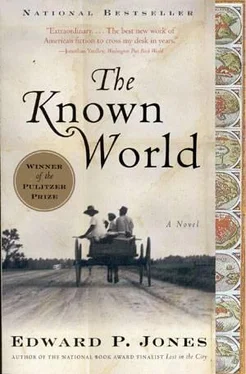”It’s a mystery,” he said, “and the law doesn’t like these kinds of mysteries.”
“I don’t either,” Caldonia said. “Do you think they could just have escaped from the county?”
He held his hat down at his side and thought of Travis and Oden selling Augustus. He did not believe they would sell three more Negroes so soon after Augustus and after he had warned them. And, too, he had a strong sense that whatever had happened, Moses was involved. “I am beginning to see that as a possibility,” he said, raising his hat and running his hand along the brim. When she was younger, Minerva had put on one of his hats and he and Winifred had laughed, and so had his father. She was still nine. “They have escaped or-and you have to see this as being possible-they are dead somewhere.”
“Why not just hiding out?”
He brushed at the brim. “I have had my people look in every spot in this county, and unless they have taken to living in tree trunks or beneath the earth, then…”
She wondered if the three slaves would have been covered under policies from Atlas Life, Casualty and Assurance. Payment for escaped slaves.
“I have to go see Mildred Townsend,” he said. “I will say you said howdy if that is fine by you.”
“Yes. Yes,” Caldonia said. “Please tell her I will be out tomorrow. And you have heard nothing about Augustus?” He shook his head. “It might be the same people grabbed my three that grabbed Augustus.”
“I have considered that,” he said, “but those rascals are long gone. It would be months before they could come back through. He went south. If yours escaped, they went north unless the stars and the sun confused them, and they went in another direction.” He put on his hat. “I’ll be going, Caldonia. Want to ask a few things of your servants before I do, though.”
“Yes,” she said. “Have a good day, sheriff.”
“And you, Caldonia.” She went inside.
He walked his horse to the fields and looked for a long time until he found Moses among the other slaves. Moses saw him after a time but did not acknowledge him and kept on working. Skiffington got on his horse. He was beginning to feel that matters were getting beyond his control and that if he did not soon corral it all, he and all he had built up would be lost. Augustus. Three slaves very possibly murdered. That was how it started with Gilly Patterson, a failure to corral and then William Robbins’s loss of confidence in him. He had once asked God if wanting Robbins’s confidence in him put him in a bad light with God, and the answer came back no.
He saw a child returning from a privy to the fields and asked her if she knew the three missing slaves and she said she did. Tessie, Celeste and Elias’s girl, seemed to take a while to answer and he thought she was thinking of some kind of untruth when she was really wondering why he would ask that when the answer was as easy as telling him her name. He also asked who lived in the cabin next to Moses and she told him Elias and Celeste and their children. He told her to go tell Elias he wanted to see him. She told him Elias was her father. “Tell your daddy to come here.” Elias had nothing much to say but five days later he did, and his wife begged him to keep it to himself but he said he couldn’t hold it in. Had it been anyone else, he would have held his tongue, he told Celeste. “Try to hold it then for me,” she said back.
Skiffington knocked at Mildred’s door and heard the dog bark. She invited him in but he knew he had no good news and so did not want to take up too much of her time. He said, “I am always in a hurry to get, and this is another one of those days.”
”My husband still gone,” she said.
“Yes, Mildred. I can say no more than that.”
“I thank you for the trip.”
He spent the night at William Robbins’s place and blamed his angry stomach the next morning on the tough chicken-unusual for the Robbins table-they fed him for supper. Had they somehow riled up the bird before they wrung the neck? Angered up the meat?
At supper, Robbins had said, “John, I want to set a five-hundred-dollar bounty on the head of that speculator that took Augustus Townsend. I will pay that to whoever brings him to me or to you. Do I need to say it doesn’t matter if he is dead when they bring him?”
“I think when a man sees that five-hundred-dollar number, he will think ‘dead’ without the poster saying it.”
“Good,” Robbins said and ate heartily of the chicken, of the corn, of everything on the table, and as Skiffington put his face in the bowl of water the next morning, he was grateful that Robbins had not asked about the three slaves. But that would not have been Robbins’s way-he gave a man a while to prove if he could do the job. The slaves had been gone not a week.
On his way back to town, he stopped at Caldonia’s plantation and went to the fields and sat on his horse until Moses knew that he was there. The courteous thing would have been to let the mistress of the plantation know he was about but he did not think Caldonia would mind. He stayed so long he had time to bring out his Bible and read from it, still sitting on his horse. His stomach calmed down.
That evening Caldonia allowed Moses to make love to her for the first time since the three slaves went missing. He had wanted a night with her in her bed and he told her that, but she just lay in his arms on the floor afterward and said nothing. Then he asked, “When you gonna free me?”
”What?”
“I say when you gonna free me?” She withdrew from him and stood up. “I thought you was supposed to free me.” He could not be her husband without first being free, not a proper husband anyway with authority over everyone and everything. There were free colored women married to slaves, but they did not have land and slaves.
“Please, Moses…” Neither word of mouth nor the newspaper said how many times the Bristol white woman had been whipped for lying with her slave. Had the white woman been forced by the slave, forced over and over again? Would that have mitigated the punishment? He forced me down and had his way with me, your honorable honor of the court, shouldn’t that be worth five fewer lashings? And, too, your honorable court, am I not still white? “Please, Moses, I don’t want to talk about this.” Freeing him had been on her mind but she had never put a day and a time to it.
“I want some free papers,” he said, and then added, “Missus.” He got up and put himself together. She herself was already buttoned up. He thought there was more to ask about, but Loretta knocked at the door and came in after Caldonia said, “Yes.” Moses left in a quiet rage.
Celeste told Elias about six the next morning that she was not feeling all that well. She was some six months pregnant. “A little digestion trouble maybe,” she said. “You know how your babies get about this time: wantin to see the world fore we know it’s time.”
”I’ll tell Moses you can’t work.”
“Maybe I can make it,” Celeste said.
“Mama, you can’t make it?” Tessie asked.
“Ain’t a thing to worry about, baby.”
Everyone was in the lane and Moses opened the cabin door wanting to know why Elias and his family were lingering.
Celeste was nearest him and she said she was moving a little slow.
“I want you out in them fields long with evbody else,” Moses said. He took Celeste by the arm.
“Now wait here,” Elias shouted and hit Moses’s arm with his fist and the overseer released Celeste. “Don’t touch my wife. Moses, I done told you she ain’t got it in her today. I’ll do her share, maybe Sunday, maybe nighttime. I done told you she ain’t got it in her. Let her be.” He stood between his wife and Moses. This was part of why it would be so much easier to talk to Skiffington later.
Читать дальше












